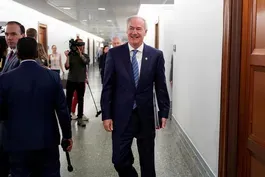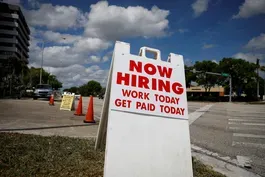
Brooks and Capehart on Biden's budget, Trump's legal trouble
Clip: 3/10/2023 | 10m 18sVideo has Closed Captions
Brooks and Capehart on Biden's budget, Trump's legal trouble, the GOP's presidential field
New York Times columnist David Brooks and Washington Post associate editor Jonathan Capehart join Geoff Bennett to discuss the week in politics, including the impact of former President Trump potential testimony before a New York grand jury, how President Biden’s budget is a preview of his reelection platform and Republican’s 2024 presidential field.
Problems with Closed Captions? Closed Captioning Feedback
Problems with Closed Captions? Closed Captioning Feedback
Major corporate funding for the PBS News Hour is provided by BDO, BNSF, Consumer Cellular, American Cruise Lines, and Raymond James. Funding for the PBS NewsHour Weekend is provided by...

Brooks and Capehart on Biden's budget, Trump's legal trouble
Clip: 3/10/2023 | 10m 18sVideo has Closed Captions
New York Times columnist David Brooks and Washington Post associate editor Jonathan Capehart join Geoff Bennett to discuss the week in politics, including the impact of former President Trump potential testimony before a New York grand jury, how President Biden’s budget is a preview of his reelection platform and Republican’s 2024 presidential field.
Problems with Closed Captions? Closed Captioning Feedback
How to Watch PBS News Hour
PBS News Hour is available to stream on pbs.org and the free PBS App, available on iPhone, Apple TV, Android TV, Android smartphones, Amazon Fire TV, Amazon Fire Tablet, Roku, Samsung Smart TV, and Vizio.
Providing Support for PBS.org
Learn Moreabout PBS online sponsorshipGEOFF BENNETT: Court watchers anticipate charges against former President Donald Trump, President Biden previews his 2024 reelection platform in dollars and cents, and FOX fights a legal battle over its lies about the 2020 election.
At the end of this week full of political developments, it's time for the analysis of Brooks and Capehart.
That's New York Times columnist David Brooks, and Jonathan Capehart, associate editor for The Washington Post.
With a welcome to you both on this Friday evening, Jonathan, we will start with you.
In this interview we just heard with former Arkansas Governor Asa Hutchinson, he said that serious times call for problem-solvers.
Amna asked him about gun violence, about Social Security solvency, about trans issues.
What did you make of the solutions that he offered?
JONATHAN CAPEHART: Well, let's start with crime, because that's the one that really piqued my interest, because he went immediately to violent crime in our inner cities.
And it made me think of a study from Third Way, the centrist -- well, Democratic-leaning think tank Third Way here in Washington, that put out a report last March, almost a year ago, March 2022, that showed that the top 10 homicide rates in the United States, eight of the 10 states with the highest homicide rates per capita in 2020 were states that voted for Donald Trump.
The number nine state is Arkansas, with 10.3 murders per capita, the ninth most homicides in the country.
And so my question for the governor would be, why is that so high in your state?
What did you do when it came to that kind of crime, and especially if they were crimes that were committed with guns?
What are you doing to be a part of the solution?
When it comes to Social Security, that Nikki Haley proposal that Amna pointed out is an interesting idea, because it's not about the retirees who are about to... GEOFF BENNETT: Raising the age.
JONATHAN CAPEHART: Raising the age.
Well, yes -- well, raising the retirement age, but for, if I heard Amna correctly, folks who are in their 20s now.
I didn't hear a direct response to that.
And I think that's going to be the challenge for the former governor.
GEOFF BENNETT: David, I want to get your reaction here.
And, as this Republican field fills out, you have got Chris Sununu, Asa Hutchinson weighing their options, Tim Scott potentially, former Vice President Mike Pence.
Who is positioned to be the moderate, to use your phrase, normie Republican candidate moving forward?
DAVID BROOKS: Yes.
This is a season where a lot of governors are reaching out to journalists.
So, I have spent a lot of time around governors all of a sudden.
And my sense is that the Republicans have quite a strong -- it's like a Major League Baseball organization with a great minor leagues and a pitcher who can't throw a pitch.
And that pitcher is Donald Trump.
But, underneath, there's a lot of talent in the party.
And when you talk to the governors -- I'm talking about Governor Kemp of Georgia, Governor Sununu of New Hampshire, former Governor Ducey of Arizona, Governor Youngkin of Virginia - - I think one of the things they point to is that people are moving to red states.
If you look at where people are moving, they're moving out of blue states and into red states.
And why is that?
Well, their claim is that people like the quality of life.
They like the tax structure.
They like the schools.
And so Florida, Georgia, Texas, just a lot of people are moving to those places.
And these governors are not focusing on some of the culture war issues, except for DeSantis.
They're not going after Disney.
They're not making trans the center of their - - their trans issues the center of whatever they want to do.
They're talking about crimes, streets, schools, the normal things that governance is all about.
And so I do think there's a lane for a -- somebody who's going to focus on quality of life.
And if I had to pick out one person right now, I would say Chris Sununu of New Hampshire.
And that's mostly because he's just a warm, friendly, natural, good guy that people like.
He won a very impressive reelect victory up there in New Hampshire, a pretty mixed state.
And, somehow, he leaps out to me in these early days as someone with just political skill.
And so, if there's going to be a normie, or somebody who is going to focus on quality of life, somehow, Governor Sununu seems to me, at least a potential, that person.
GEOFF BENNETT: Jonathan, Florida Governor Ron DeSantis has reportedly indicated to folks privately that he intends to run.
He's in Iowa today, headed to Nevada tomorrow.
There are Democrats who say that a DeSantis presidency could potentially be more troubling than a second Trump term, in part because, in Ron DeSantis, you have a Harvard -- Harvard- and Yale- educated lawyer, someone who he really believes in the culture wars in which he is engaged, and someone who fundamentally understands how the levers of power work and how to use them.
Where do you come down on that?
JONATHAN CAPEHART: That's exactly where I come down.
I have been saying it, and particularly to the young people who I talk to, who were so focused on Donald Trump and whether he could win -- win reelection to the White House in 2024.
I said, forget about Donald Trump.
Focus on the entire field, because it is about Trumpism.
And I was thinking specifically about Governor DeSantis, because he is Trump, but Trump with the real Ivy League pedigree, who has been a governor, who knows how the levers of power work and knows how to work them.
And, also, let's not forget, the big red wave that everyone was talking about that was supposed to sweep Congress didn't happen federally, but it happened in Florida.
And Governor DeSantis won by a big margin.
And so we have to keep that in mind.
That's what makes Governor DeSantis so dangerous.
I noticed that David didn't mention him in his -- when he was rattling off all the normies.
And he didn't mention him because of what David mentioned, that Governor DeSantis is so focused on the culture wars.
That's why he's coming in second to Donald Trump.
But let's not forget -- and this is the other reason, final reason why he is dangerous.
The culture war stuff works, because it's emotional.
And that is what I think the -- the entire nation has to keep his eyes on that.
GEOFF BENNETT: The other big story this week was The New York Times first reporting that the Manhattan prosecutors have invited former President Donald Trump to appear before a grand jury investigating his alleged role in hush money payments and an alleged cover-up.
What are the political implications, David, if he is the first president ever to be indicted, add to that while he's running for office?
DAVID BROOKS: Yes, I had the profound thought earlier today that being indicted is not good for your political career.
(LAUGHTER) DAVID BROOKS: So, it reminds people that -- of Stormy Daniels, that whole mess.
And so it can't be good.
I don't think the New York case is where I would keep my focus.
I just think, to lift this hush money payment to the level of a felony strikes me, and from what I have read, strikes a lot of people as a bit of a stretch.
To me, the Georgia case is the real case.
Trying to corrupt an electoral process, that's something anybody can understand.
And that strikes me as felony-like.
And I would say, I'm struck, even talking to Republicans over the last six months, how much January 6 has had an accumulative power on their minds.
There are some people for whom it's fine, it was a peaceful walk in the park, as Tucker Carlson said, but there are a lot of people who didn't say much at the time, but now that they actually have candidates in front of them, they're thinking, that's just -- that was horrible and that was a menace.
And so now all the other Republican candidates, aside from Donald Trump and maybe DeSantis, are beginning to use January 6 as a way to distinguish themselves from Trump.
And so I think that Georgia case is the -- is the indictment I'd look for.
GEOFF BENNETT: How would an indictment -- and, again, we don't know that it's going to end in any charge, but how would that affect Donald Trump's standing?
Because he is someone who has spent -- has invested a lot of time and energy in sowing distrust about the institutions that seek to hold him to account.
When he was at CPAC this past weekend, he told his supporters: They're not coming after me.
They're coming after you.
That would have, could have a rallying effect, could it not?
JONATHAN CAPEHART: Sure.
Sure, it could have a rallying effect.
And it would have -- excuse me -- no impact on his standing, meaning he's not going to lose support.
His supporters are there.
They are his bedrock, 28, 30 percent.
I think the other reason why I don't see any change to his political standing is because, in order for him to have some sort of change in his standing, it would require him to have a sense of shame.
And we know, after four years -- well, in his run for president and his four years in the White House, he has no shame.
And so, of course, he's going to -- he would stay in the race if he gets indicted.
Of course, he will stay in the race and walk the gauntlet of news cameras outside a courtroom in New York City while he's supposed to be running for president, because it all in the end, to his mind, inures to his benefit.
Meanwhile, going through all that does nothing for the Republican Party, does nothing for our political discourse, and does nothing for our democracy.
GEOFF BENNETT: Governor Chris Sununu, David, this week, I had the chance to interview him.
And he said that he's not concerned about the number of Republicans who decide to run in this race.
The question was about, if there are too many Republicans in the field, does that benefit Donald Trump?
He said the bigger thing is, these Republicans have to know when to get out.
How does that strike you?
DAVID BROOKS: Well, he's right in theory.
It's a lot harder in practice, because, if you're running for president, you're raising a ton of money.
And so you build up these war chests, and, suddenly, a couple of weeks go by, it doesn't look so good.
A, do you want to look at your donors and say, eh, sorry, you wasted your money?
You're not allowed to give them the money back.
And so -- and you have to spend it that election cycle.
And so it's actually hard to withdraw, because you have this pot of money there.
And the instinct is to say, oh, I will just stay in.
I have got this money.
I might as well see what I got and spend it.
And so, since it's structurally hard to get out, for this fund-raising reason I have described, a lot of them are going to face the temptation to stay in longer than they should.
And that will -- that will split the field.
I think it's a real problem for anybody who does not want Donald Trump to be the nominee.
GEOFF BENNETT: David Brooks and Jonathan Capehart, appreciate you both.
Have a good weekend.
JONATHAN CAPEHART: Thanks, Geoff.
DAVID BROOKS: Thank you.
Arms manufacturers struggle to get Ukraine enough ammunition
Video has Closed Captions
Clip: 3/10/2023 | 10m 4s | Arms manufacturers struggle to supply Ukraine with enough ammunition (10m 4s)
Atmospheric river hits portions of California
Video has Closed Captions
Clip: 3/10/2023 | 2m 52s | Atmospheric river hits portions of California, compounding weather woes (2m 52s)
Robust hiring raises prospects for more interest rate hikes
Video has Closed Captions
Clip: 3/10/2023 | 6m 18s | Another strong jobs report raises more questions about inflation and interest rate hikes (6m 18s)
Providing Support for PBS.org
Learn Moreabout PBS online sponsorshipSupport for PBS provided by:
Major corporate funding for the PBS News Hour is provided by BDO, BNSF, Consumer Cellular, American Cruise Lines, and Raymond James. Funding for the PBS NewsHour Weekend is provided by...














